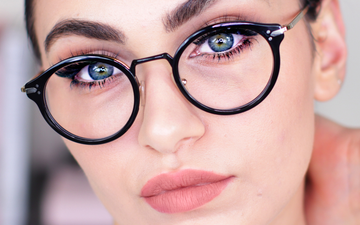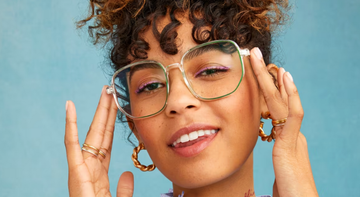Welcome to our exploration of the intriguing world of blue light and blue light glasses! Have you ever wondered what exactly blue light is and why it's a topic of conversation in today's digital age? Essentially, blue light is a type of light with a particularly short wavelength, producing a higher amount of energy. It's naturally emitted by the sun, but it's also prevalent in man-made sources like smartphones, computer screens, and LED lighting.
Now, enter the innovative solution to minimize the impact of blue light: blue light glasses. These specialized glasses are designed with lenses that can filter out or reduce blue light exposure from screens and artificial lighting. The idea is to protect our eyes from the potential strain and disruption caused by prolonged exposure to blue light, especially in an era where digital devices are an integral part of our daily lives. Let's delve deeper into this topic and understand how these glasses can be a game-changer in protecting our eye health.

TABLE OF CONTENTS
- The Science Behind Blue Light
- Understanding Blue Light Glasses
- Effectiveness of Blue Light Glasses
- Practical Considerations
- Conclusion
The Science Behind Blue Light
-
Sources of Blue Light:
Blue light is everywhere in our modern world. The most common sources are digital screens, like those of smartphones, tablets, computers, and televisions, which we interact with daily. Beyond these, blue light is also emitted by LED and fluorescent lighting, significantly contributing to our overall exposure. This omnipresence of blue light raises questions about its impact on our health, especially considering the increasing hours we spend in front of screens.
-
Potential Health Effects:
The concern about blue light isn't unfounded. Research indicates that exposure to blue light, especially late at night, can disrupt our natural sleep cycle. This is because blue light suppresses the production of melatonin, the hormone responsible for regulating sleep. Additionally, prolonged exposure to blue light can lead to digital eye strain, characterized by symptoms like dry eyes, headache, and blurred vision. As we continue to embrace digital technology in our lives, understanding and mitigating these potential health effects becomes crucial.

Understanding Blue Light Glasses
-
How Blue Light Glasses Work:
Blue light glasses are designed with a specific purpose: to filter and reduce blue light exposure from screens and artificial sources. The lenses in these glasses are coated with a special material that reflects and absorbs blue light, preventing it from reaching our eyes. This filtering technology helps in minimizing the potential negative effects of blue light, such as eye strain and sleep disruption. By doing so, these glasses aim to provide a more comfortable visual experience, especially during prolonged screen time.
-
Types of Blue Light Glasses Available:
The market offers a variety of blue light glasses to cater to different needs and preferences. Some glasses are targeted for heavy digital users, featuring high levels of blue light filtration. Others are designed for general use, providing a balance between blue light protection and minimal color distortion. You can also find prescription blue light glasses and those that are purely for aesthetic purposes with minimal filtering properties. Understanding your specific needs and the amount of time you spend in front of screens will guide you in choosing the right type of blue light glasses.

Effectiveness of Blue Light Glasses
-
Research on Blue Light Glasses Effectiveness:
The effectiveness of blue light glasses in filtering blue light has been a subject of ongoing research. Studies suggest that these glasses can significantly reduce blue light exposure, thereby mitigating eye strain and improving sleep quality. For instance, a study published in the Journal of Applied Ergonomics found that participants wearing blue light glasses experienced less eye fatigue and improved sleep patterns. However, it's important to note that research outcomes can vary, and not all glasses are created equal in their blue light blocking capabilities.
-
Varying Degrees of Filtration:
Blue light glasses come in various filtration levels, tailored to different user needs. Some glasses offer a high degree of blue light blocking, ideal for individuals who spend extended hours in front of screens. These are particularly beneficial in the evening to minimize sleep disturbances. Other glasses provide a more moderate level of filtration, suitable for general use throughout the day without altering color perception significantly. The choice of filtration level should be based on your lifestyle, screen time, and sensitivity to blue light.

Practical Considerations
-
Choosing the Right Blue Light Glasses:
Selecting the perfect pair of blue light glasses involves a few key factors. First, assess your screen time and how sensitive you are to blue light. If you spend extended hours in front of digital screens, opt for glasses with higher blue light filtration. If your screen time is moderate, glasses with moderate filtration should suffice. Ensure the glasses are comfortable and fit well since you'll be wearing them regularly. Lastly, consider your style preferences as blue light glasses come in various designs and frames. Look for reputable brands known for their quality and blue light-blocking capabilities.
-
Tips for Reducing Blue Light Exposure in Daily Life:Blue light glasses are one step
toward protecting your eyes. To further reduce blue light exposure, consider these daily life
adjustments:
- Take regular breaks from screens to rest your eyes.
- Utilize the night mode or blue light filter on your devices, especially during evening hours.
- Adjust indoor lighting to warmer tones with less blue light emission.
- Avoid screen usage at least an hour before bedtime to improve sleep quality.
- Spend time outdoors during the day to balance your exposure with natural light.
By combining the right choice of blue light glasses with these practical lifestyle changes, you can effectively safeguard your eyes from excessive blue light exposure.If you want to delve deeper into "How to Choose Blue Light Glasses," please read our blog.

Conclusion
To safeguard your eye health from blue light exposure, choose blue light glasses tailored to your screen time and comfort. Reduce screen time, use night mode, and opt for warmer lighting in daily life. Combining these practices with blue light glasses can enhance your overall well-being.




